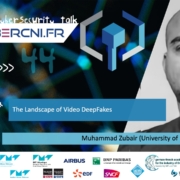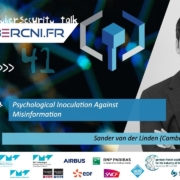[T44] The Landscape of Video DeepFakes – Muhammad Zubair (Canadian Institute for Cybersecurity, University of New Brunswick)
On Fri, July 18th, 2025, 2pm CET, we welcome Muhammad Zubair (Canadian Institute for Cybersecurity, University of New Brunswick), for another edition of TALK.CYBERcni.fr on “The Landscape of Video DeepFakes”. From viral fun to dangerous fraud: Unmasking the power and peril of DeepFakes. Share and join!
You are cordially invited to join the free live stream on youtube and LinkedIn! Please share the link https://talk.cybercni.fr/44 with your interested friends!
- Trailer: https://youtu.be/7c1wv_dYJsA
- LinkedIN Event: https://www.linkedin.com/events/7351695568018038786
- Facebook Event: https://www.facebook.com/events/568046069579769/
- Youtube: https://www.youtube.com/watch?v=7LsEHXWvGQE&list=PLdftPKA9mTfaDJxqwexil2mPhUFIA9ITd
- Stream redirect (for every edition): https://TALK.cyberCNI.fr/stream
Newsletter with invitations: Subscription on https://TALK.cyberCNI.fr
Help us spreading the news
The best talks are those with an interested diverse audience! Therefore, please use the following media to spread the news in your networks:
Thank you!
Abstract
Deepfakes are synthetic media generated using artificial intelligence to manipulate audio, video, or images in highly convincing ways. This presentation will provide an introduction to what deepfakes are and how they are created. It will explore the various ways deepfakes are being used—ranging from entertainment to misinformation.
A key focus will be on how deepfakes can be detected using current technological approaches. The session will also discuss the risks associated with deepfakes and why detection is becoming increasingly important. Finally, it will review the legal and regulatory efforts underway to address the growing challenges posed by deepfake content.
Watch the trailer linked above!
Muhammad Zubair
Muhammad Zubair completed his master degree from University of New Brunswick (UNB) in 2025. His research topic was DeepFake Detection. During his studies at UNB, he published and reviewed paper for Q1 journals. He also conducted multiple presentations to educate public about DeepFakes. He studies courses related to cybersecurity and artifical intelligence. Zubair has 3 years of previous industry experience. In his industrial experience he worked for companies, he worked for clinents like BMW. Currently he is working remotely as backend developer for fortex solution. He is currently looking for an position in AI and back related technologies.
University of New Brunswick
The University of New Brunswick is a public university with two primary campuses in Fredericton and Saint John, New Brunswick. It is the oldest English-language university in Canada, and among the oldest public universities in North America.
The Canadian Institute for Cybersecurity (CIC) is a comprehensive multidisciplinary training, research and development, and entrepreneurial unit that draws on the expertise of researchers in the social sciences, business, computer science, engineering, law and science. Based at the University of New Brunswick in Fredericton, the institution is the first of its kind to bring together researchers and practitioners from across the academic spectrum to share innovative ideas, create disruptive technology and carry out groundbreaking research into the most pressing cybersecurity challenges of our time.
The Cyber CNI Lecture Series is a free monthly event that typically takes place on the last Friday of the month from 2pm to 3h30pm CET.
The Cyber CNI Speaker series aims to raise awareness and understanding of cyber security issues among all audiences. It aims to enable an ongoing dialogue between experts from industry and academia and the general public (citizens, families, small and large businesses, public organizations, etc.). All of us are concerned.
The events are broadcast live on Youtube (https://talk.cybercni.fr/) and LinkedIn, allowing worldwide remote participation – including a tool to participate in the discussion.
You can add the event calendar via ICS, webcal, HTML.
How the digital transformation is changing our lives
Our society relies more and more on information and operational technologies. Examples include water, energy, heat and cooling supply, communications, healthcare, production and processing of goods, transportation, national security, banking, research and education, and food production.
What all these areas have in common is that they make intensive use of networked distributed computer systems. These systems can be attacked in many ways. This is no longer just a problem for computer “pros” because computer systems are essential to all of us. The effects of “cyber-attacks” range from power outages to the collapse of the health care or banking sectors.
Program and registration: https://talk.cybercni.fr/




